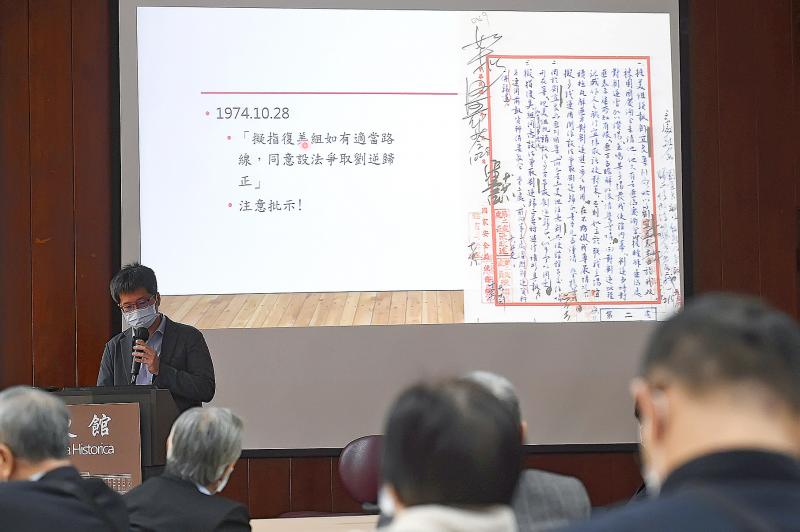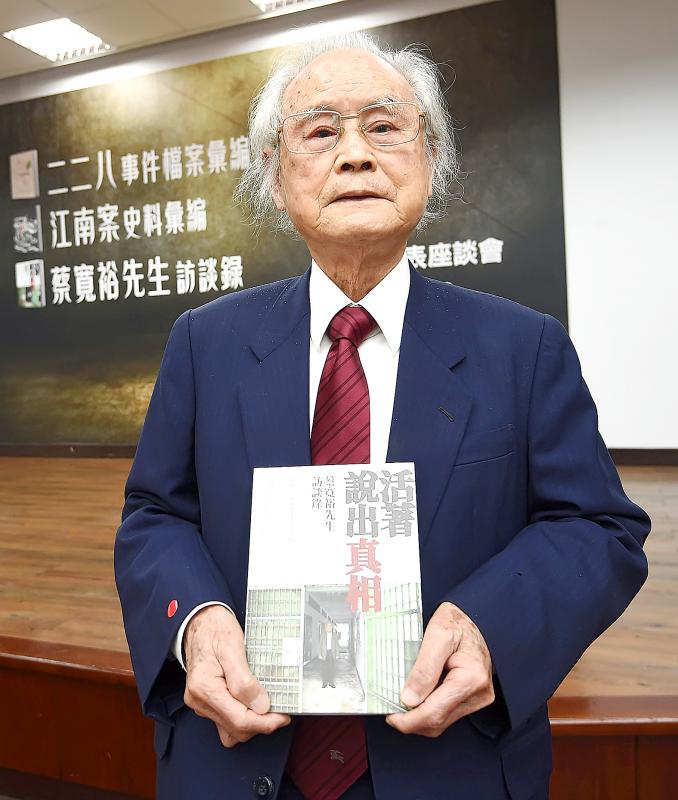The Academia Historica on Saturday published documents and eyewitness accounts of the Chinese Nationalist Party (KMT) regime’s human rights abuses during the Martial Law era.
Academia Historica President Chen Yi-shen (陳儀深) told a news conference in Taipei that the published books and papers represented more than 20 years of research and field studies by himself and other researchers.
“Although there are still aspects which require more study, we have made a lot of progress over the decades to document state violence and atrocities against citizens from that period,” he said.

Photo: Chen Chih-chu, Taipei Times
Among the works released was the three-volume Documentary Collection on Political Incident: The Henry Liu Case on the Oct. 15, 1984, killing of China-born US writer Henry Liu (劉宜良), who used the pen name Chiang Nan (江南).
Commissioned by the Academia Historica and the Taiwan Human Rights Museum, the volumes contain archival materials, interview transcripts and government papers on the death of Liu, who was shot at his home in Daly City, California, said Wu Chun-ying (吳俊瑩), one of its authors.
Liu, a vocal critic of the KMT regime, was best known for writing an unauthorized biography of Chiang Ching-kuo (蔣經國), who was later to take over the regime from his father, then-president Chiang Kai-shek (蔣介石).

Photo: Chen Chih-chu, Taipei Times
Wu said the documents and records from Taiwan and the US corroborated findings that the KMT regime knew about the planned murder of Liu, which was authorized by the Military Intelligence Bureau.
Then-vice admiral Wang Hsi-ling (汪希苓), head of the bureau, instructed Chen Chi-li (陳啟禮) of the Bamboo Union to murder Liu, which he did with two other members of the gang, Wu said.
An FBI and US Department of Justice investigation found evidence that implicated the Military Intelligence Bureau and the Bamboo Union in the murder, and they sent a team headed by Mark Richard, then deputy assistant attorney general for the criminal division of the department, to Taiwan to interview people connected with the case, Wu said.
The declassified documents showed that one communique from the department to the KMT government expressed grave concerns about Taiwanese authorities’ handling of the case, Wu said, adding that the documents also suggest that the government’s top leadership might have known about and authorized the murder.
Another book revealed at the news conference was on White Terror victim Tsai Kuan-yu (蔡寬裕).
After graduating from university in the 1950s, Tsai became a target of the KMT regime, and was arrested and charged twice, spending a total of 13 years in prison.
He was also involved in the Taiyuan Prison Insurrection on Feb. 8, 1970, when he and other political prisoners at Taitung County’s Taiyuan Prison attempted to escape to begin an armed insurrection against the KMT regime.
Tsai, now is in his late 80s, said he was asked by Tsan Tien-tseng (詹天增), one of the leaders of the insurrection who was executed soon after the incident, to survive the ordeal and tell the world what had happened.
“It is my duty to do so, for my compatriot in the prison who had sacrificed his life,” Tsai said.

POSITIVE DEVELOPMENT: Japan and the US are expected to hold in-depth discussions on Taiwan-related issues during the meeting next month, Japanese sources said The holding of a Japan-US leaders’ meeting ahead of US President Donald Trump’s visit to China is positive news for Taiwan, former Japan-Taiwan Exchange Association representative Hiroyasu Izumi said yesterday. After the Liberal Democratic Party’s landslide victory in Japan’s House of Representatives election, Japanese Prime Minister Sanae Takaichi is scheduled to visit the US next month, where she is to meet with Trump ahead of the US president’s planned visit to China from March 31 to April 2 for a meeting with Chinese President Xi Jinping (習近平). Japan and the US are expected to hold in-depth discussions on Taiwan-related issues during the

‘LIKE-MINDED PARTNER’: Tako van Popta said it would be inappropriate to delay signing the deal with Taiwan because of China, adding he would promote the issue Canadian senators have stressed Taiwan’s importance for international trade and expressed enthusiasm for ensuring the Taiwan-Canada trade cooperation framework agreement is implemented this year. Representative to Canada Harry Tseng (曾厚仁) in an interview with the Central News Agency (CNA) said he was increasingly uneasy about Ottawa’s delays in signing the agreement, especially as Ottawa has warmed toward Beijing. There are “no negotiations left. Not only [is it] initialed, we have three versions of the text ready: English, French and Mandarin,” Tseng said. “That tells you how close we are to the final signature.” Tseng said that he hoped Canadian Prime Minister Mark Carney

President William Lai (賴清德) yesterday bestowed one of Taiwan’s highest honors on Saint Vincent and the Grenadines (SVG) Ambassador Andrea Clare Bowman in recognition of her contributions to bilateral ties. “By conferring the Order of Brilliant Star with Grand Cordon on Ambassador Bowman today, I want to sincerely thank her, on behalf of the Taiwanese people, for her outstanding contribution to deepening diplomatic ties between Taiwan and SVG,” Lai said at a ceremony held at the Presidential Office in Taipei. He noted that Bowman became SVG’s first ambassador to Taiwan in 2019 and

A man walks past elementary school artworks at the Taipei Lantern Festival in Ximen District yesterday, the first day of the event. The festival is to run from 5pm to 10pm through March 15.